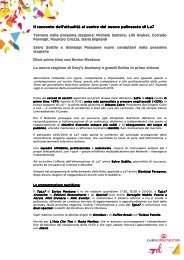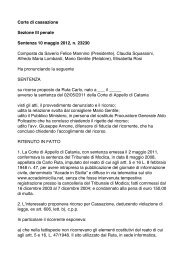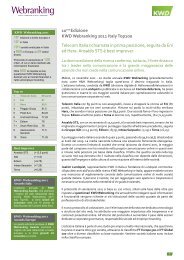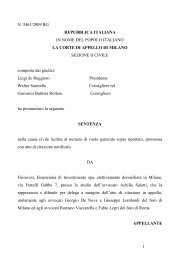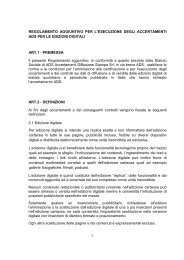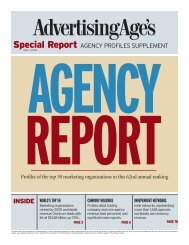What We Know About the Business of Digital Journalism
What We Know About the Business of Digital Journalism
What We Know About the Business of Digital Journalism
Create successful ePaper yourself
Turn your PDF publications into a flip-book with our unique Google optimized e-Paper software.
The Story So Far: <strong>What</strong> <strong>We</strong> <strong>Know</strong> <strong>About</strong> <strong>the</strong> <strong>Business</strong> <strong>of</strong> <strong>Digital</strong> <strong>Journalism</strong><strong>Digital</strong> executives also must constantly decide when to deploy staff to workon new or experimental products that don’t meet <strong>the</strong> new productivity tests.Tumblr, <strong>the</strong> social media microblogging platform, gets billions <strong>of</strong> monthly pageviews overall, but its value to most media companies is still negligible. Somejournalists are fascinated with what it might become in terms <strong>of</strong> driving trafficor buzz—and <strong>the</strong>ir employers let <strong>the</strong>m spend time with <strong>the</strong> platform, if only tobe sure <strong>the</strong>y don’t miss out on something that might turn into <strong>the</strong> next Twitter.For example, GQ has a Tumblr site with just 12,000 followers—a tiny fraction <strong>of</strong><strong>the</strong> print magazine’s monthly circulation <strong>of</strong> 800,000. GQ’s senior editor, DevinGordon, says “Tumblr is a side project, but I care a lot about it.” He and aneditorial assistant limit <strong>the</strong>mselves to no more than two hours per week postingTumblr content.Managers <strong>of</strong> digital operations must also deal with journalists who are able toestablish a following on <strong>the</strong> basis <strong>of</strong> <strong>the</strong>ir own talents ra<strong>the</strong>r than <strong>the</strong> prestige orreach <strong>of</strong> <strong>the</strong> news organization. Andrew Sullivan’s Daily Dish was responsiblefor 1 million monthly unique visitors, or about 20 percent <strong>of</strong> <strong>the</strong> traffic, at <strong>the</strong>Atlantic’s site. But it was Sullivan’s audience, not <strong>the</strong> Atlantic’s; <strong>the</strong> blogger owned<strong>the</strong> brand equity. So when he moved to The Daily Beast in April 2011, he tookhis unique users with him. This phenomenon isn’t entirely new, <strong>of</strong> course. Columnistslike Walter Winchell would change employers in <strong>the</strong> glory days <strong>of</strong> <strong>the</strong>1920s tabloid wars. 18 But in digital journalism, audiences can follow stars withgreat ease, and conceivably journalists with big individual followings could beginto keep, and try to make money from, data about <strong>the</strong>ir readers, ra<strong>the</strong>r than leavingthat to <strong>the</strong>ir employers.DVorkin says he is changing <strong>the</strong> way he judges <strong>the</strong> quality <strong>of</strong> a reporter. “Itused to be a question <strong>of</strong> how <strong>the</strong>y develop <strong>the</strong>ir sources. Now it’s how <strong>the</strong>y develop<strong>the</strong>ir sources and <strong>the</strong>ir audience.” He expects Forbes journalists not just tocover news, but to be “maestros” <strong>of</strong> comments and <strong>of</strong> followers. And <strong>the</strong>y have tobe recruiters. “When we used to hire a reporter, we’d say, ‘Show me some clips.’Now I say, ‘Who is in your orbit? Who are your sources? Who do you know?Who can you convince to contribute?’ ”124





